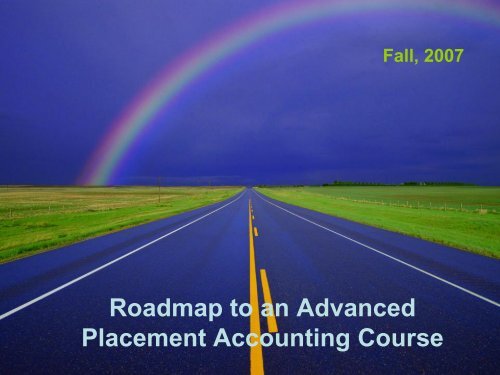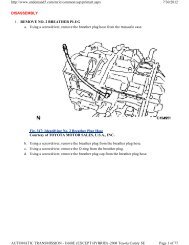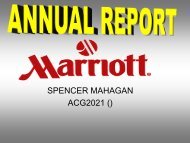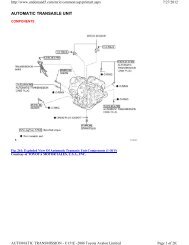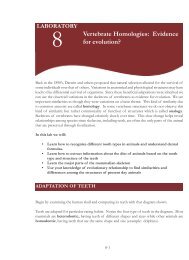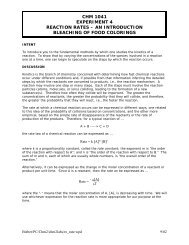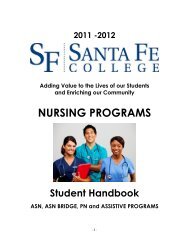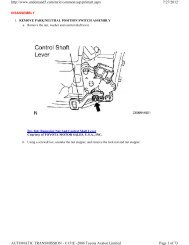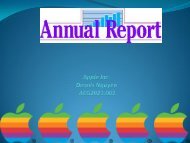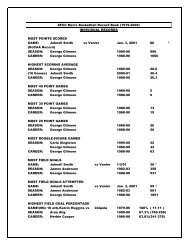Roadmap to an Advanced Placement ... - Santa Fe College
Roadmap to an Advanced Placement ... - Santa Fe College
Roadmap to an Advanced Placement ... - Santa Fe College
Create successful ePaper yourself
Turn your PDF publications into a flip-book with our unique Google optimized e-Paper software.
<strong>Roadmap</strong> <strong>to</strong> <strong>an</strong> Adv<strong>an</strong>ced<br />
Fall, 2007<br />
<strong>Placement</strong> Accounting Course
Outcome…<br />
If we know where we are going we are more likely <strong>to</strong> get there…<br />
• AP Accounting Course<br />
• Weighted Honors Accounting Course
The Bad News…
• No new AP courses <strong>to</strong> be licensed in next 5<br />
years as resources, both fin<strong>an</strong>cial <strong>an</strong>d hum<strong>an</strong>,<br />
are fully committed <strong>to</strong> m<strong>an</strong>aging the quality of<br />
existing courses, exams, <strong>an</strong>d professional<br />
development programs. (AP has course suites in<br />
Math, English, Natural Sciences, Social Sciences, <strong>an</strong>d World<br />
L<strong>an</strong>guages)<br />
• The AP or Pre-AP identifier c<strong>an</strong>not be used<br />
when labeling <strong>an</strong> aspiring High school course.<br />
• Due <strong>to</strong> the tremendous efforts being<br />
undertaken by advocates for new AP course<br />
proposals (more th<strong>an</strong> 20 proposed additions)<br />
the bar for consideration has been raised…
The Good News…<br />
More Time <strong>to</strong> meet AP Course <strong>an</strong>d<br />
Exam Requirements
<strong>Roadmap</strong>…<br />
If we know where we are going we are more likely <strong>to</strong> get there<br />
– What’s currently happening?<br />
– What are the New AP Course<br />
Proposal Requirements?
Current Initiatives:<br />
• KSU-D<strong>an</strong> Deines<br />
• Kentucky-Penny Gold
1. The Course<br />
2. The Assessment<br />
3. The Professional Development<br />
4. <strong>College</strong> Credit<br />
5. Dem<strong>an</strong>d
• “Description of the st<strong>an</strong>dard, commonly offered college course<br />
upon which AP course will be modeled, with a focus on the<br />
knowledge, skills, abilities developed in the course <strong>an</strong>d<br />
descriptions of the ways this course produces in students such<br />
knowledge, skills, <strong>an</strong>d abilities. In addition, the description<br />
should specify the prerequisite knowledge, skills, <strong>an</strong>d abilities<br />
required for success in the course.<br />
• 10 or more sample syllabi representing a r<strong>an</strong>ge of higher<br />
education institutions; these syllabi should demonstrate that<br />
there is a degree of consistency across colleges <strong>an</strong>d universities<br />
in what is taught <strong>an</strong>d learned in this course.<br />
• A description of the sequent course in which students earning AP<br />
credit would receive placement, typically the next course in the<br />
sequence following the st<strong>an</strong>dard, introduc<strong>to</strong>ry college course.<br />
• 10 or more sample syllabi for the sequent course, representing a<br />
r<strong>an</strong>ge of higher education institutions; these syllabi should<br />
demonstrate that there is a degree of consistency across<br />
colleges <strong>an</strong>d universities in what is taught in this course.”<br />
Source: The <strong>College</strong> Board
What <strong>College</strong> Board currently knows about introduc<strong>to</strong>ry accounting…
What <strong>College</strong> Board currently knows about introduc<strong>to</strong>ry accounting…
What <strong>College</strong> Board currently knows about introduc<strong>to</strong>ry accounting…
• “How are knowledge, skills, <strong>an</strong>d abilities in this<br />
discipline assessed at the college level? What would<br />
be measured by the AP assessment? What formats<br />
would be needed for the assessment? Is <strong>an</strong>y special<br />
evidence required?” Source: The <strong>College</strong> Board<br />
• For example, Macroeconomics <strong>an</strong>d Microeconomics<br />
AP exams consist of:<br />
– Multiple choice questions,<br />
– Two short free response, <strong>an</strong>d<br />
– One long free response.<br />
• Why Fin<strong>an</strong>cial Accounting CLEP Exam does not<br />
work...different objectives, different target markets
• Curriculum Survey-Test Specifications-Exam: CLEP Fin<strong>an</strong>cial Accounting<br />
Curriculum Survey, Summary of Results (.pdf/110K)<br />
• Description of the Examination<br />
• The purpose of the exam is <strong>to</strong> assess student mastery of the skills <strong>an</strong>d<br />
concepts required for success in a first-semester fin<strong>an</strong>cial accounting<br />
course. <strong>College</strong>s may award credit for a one-semester course in fin<strong>an</strong>cial<br />
accounting.<br />
• The exam contains 75 multiple choice questions <strong>an</strong>swered in 90 minutes.<br />
• Knowledge <strong>an</strong>d Skills Required<br />
• The purpose of the exam is <strong>to</strong> assess student mastery of the skills <strong>an</strong>d<br />
concepts required for success in a first-semester fin<strong>an</strong>cial accounting<br />
course. Exam questions require students <strong>to</strong> demonstrate that they:<br />
• Are familiar with accounting concepts <strong>an</strong>d terminology<br />
• Have <strong>an</strong> underst<strong>an</strong>ding of the preparation, use, <strong>an</strong>d <strong>an</strong>alysis of accounting<br />
data <strong>an</strong>d fin<strong>an</strong>cial reports issued for both internal <strong>an</strong>d external purposes<br />
• C<strong>an</strong> apply accounting techniques <strong>to</strong> problem-solving situations involving<br />
computations<br />
• Underst<strong>an</strong>d the rationale for generally accepted accounting principles <strong>an</strong>d<br />
procedures
• 20–30% General <strong>to</strong>pics<br />
• • Generally accepted accounting<br />
• principles<br />
• • Rules of double-entry accounting/<br />
• tr<strong>an</strong>saction <strong>an</strong>alysis/accounting<br />
• equation<br />
• • The accounting cycle<br />
• • Business ethics<br />
• • Purpose of, presentation of, <strong>an</strong>d<br />
• relationships between fin<strong>an</strong>cial<br />
• statements<br />
• • Forms of business<br />
• 20–30% The Income Statement<br />
• • Presentation format issues<br />
• • Recognition of revenue <strong>an</strong>d<br />
• expenses<br />
• • Cost of goods sold<br />
• • Irregular items (e.g., discontinued<br />
• operations, extraordinary items, etc.)<br />
• • Profitability <strong>an</strong>alysis<br />
• 30–40% The Bal<strong>an</strong>ce Sheet<br />
• • Cash <strong>an</strong>d internal controls<br />
• • Valuation of accounts <strong>an</strong>d notes<br />
• receivable (including bad debts)<br />
• • Valuation of inven<strong>to</strong>ries<br />
• • Acquisition <strong>an</strong>d disposal of<br />
• long-term asset<br />
• • Depreciation/Amortization/<br />
• Depletion<br />
• • Int<strong>an</strong>gible assets (e.g., patents,<br />
• goodwill, etc.)<br />
• • Accounts <strong>an</strong>d notes payable<br />
• • Long-term liabilities (e.g., bonds<br />
• payable)<br />
• • Owner’s equity<br />
• • Preferred <strong>an</strong>d common s<strong>to</strong>ck<br />
• • Retained earnings<br />
• • Liquidity, solvency <strong>an</strong>d activity<br />
• <strong>an</strong>alysis<br />
• 5–10% Statement of Cash Flows<br />
• • Indirect method<br />
• • Cash flow <strong>an</strong>alysis<br />
• • Operating, fin<strong>an</strong>cing <strong>an</strong>d investing<br />
• activities<br />
• Less th<strong>an</strong> 5% Miscell<strong>an</strong>eous<br />
• • Investments<br />
• • Contingent liabilities
• “What is the difference right now between<br />
the high school course <strong>an</strong>d the college<br />
course?<br />
• What types of professional development<br />
will be needed?<br />
• What new or additional knowledge, skills,<br />
<strong>an</strong>d abilities do high school teachers need<br />
<strong>to</strong> deliver the college-level course?”<br />
Source: The <strong>College</strong> Board
Current Professional Development Efforts:<br />
• K<strong>an</strong>sas-KSU Pilot Summer Workshop<br />
• Kentucky-KyCPA/KyDOE/KySBA Teacher<br />
Training partnership for new Courses<br />
• Florida HS Accounting Teacher Summer<br />
Camp -multiple day teaching conference<br />
• AICPA or State Society Sponsored<br />
Meetings -one day workshops that dealt<br />
primarily with the Takin’ Care of Business<br />
curriculum<br />
Bot<strong>to</strong>m line: Funds available <strong>to</strong> co-sponsor outreach/ recruiting events
• “How m<strong>an</strong>y colleges <strong>an</strong>d universities in the<br />
United States are seeking a credit-byexamination<br />
program in this discipline?<br />
• How m<strong>an</strong>y college <strong>an</strong>d university<br />
academic departments in the United<br />
States agree <strong>to</strong> provide credit in this<br />
discipline if <strong>an</strong> AP assessment were<br />
created?”<br />
Source: The <strong>College</strong> Board
Bar Raised for New AP Courses <strong>an</strong>d Exams<br />
AP Application must document:<br />
• 1,500 colleges <strong>an</strong>d universities agree <strong>to</strong><br />
provide credit/placement for acceptable<br />
perform<strong>an</strong>ce on new AP exam<br />
Source: The <strong>College</strong> Board
• “How m<strong>an</strong>y high schools in the United<br />
States are currently teaching a collegelevel<br />
course in this discipline?<br />
• How m<strong>an</strong>y high schools agree <strong>to</strong> offer this<br />
course in the first year it is available?<br />
• How m<strong>an</strong>y students will take the AP<br />
assessment in its 1 st , 2 nd , 3 rd , 4 th , <strong>an</strong>d 5 th<br />
years of availability?”<br />
Source: The <strong>College</strong> Board
Bar Raised for New AP Courses <strong>an</strong>d Exams<br />
AP Application must document:<br />
• 2,500 US secondary schools offering a<br />
course equivalent <strong>to</strong> AP-level curriculum<br />
• 25,000 students exam ready<br />
• Advocates invest in building elementary <strong>an</strong>d<br />
middle school programs that will enable U.S.<br />
students <strong>to</strong> study the subject at <strong>an</strong> adv<strong>an</strong>ced<br />
level.<br />
Source: The <strong>College</strong> Board
<strong>Roadmap</strong>…<br />
If we know where we are going we are more likely <strong>to</strong> get there<br />
• What’s next?...<br />
– Mirror AP Course Development Process<br />
• Development Taskforce or Committee<br />
• Fulfill AP Proposal Application Requirements<br />
• Secure Funding<br />
– Identify <strong>an</strong>d Eliminate Obstacles <strong>an</strong>d Roadblocks
• Generally appointed by <strong>College</strong> Board <strong>to</strong> prepare<br />
course descriptions <strong>an</strong>d exams.<br />
• Six or seven highly qualified members from a<br />
variety of types of secondary schools <strong>an</strong>d college<br />
teachers from all regions of the country.<br />
• The subject matter authorities when making<br />
decisions in exam construction process.<br />
Source: The <strong>College</strong> Board
Obstacles <strong>to</strong> Progress<br />
• Current or New HS Course<br />
• Weighted GPA course-District or DOE<br />
• Course-Career & Technical or Academic<br />
• <strong>College</strong> Accreditation by AACSB or<br />
ACBSP or Regional Groups-currently<br />
required faculty credentials for articulation<br />
• Current Articulation Agreements thru<br />
exam<br />
• Content-rigor, approach, <strong>an</strong>d textbook
For more information, contact:<br />
Pre-Certification Education Executive Committee, AICPA:<br />
George Krull<br />
gwkrull@msn.com<br />
Kentucky Initiative:<br />
Penny Gold<br />
KyCPA CEO<br />
pgold@kycpaa.org<br />
KSU Initiative:<br />
Dr. D<strong>an</strong> Deines<br />
KPMG Peat Marwick Professor<br />
K<strong>an</strong>sas State University<br />
ddeines@ksu.edu<br />
Florida Initiative:<br />
Sus<strong>an</strong> Crosson<br />
Professor<br />
S<strong>an</strong>ta <strong>Fe</strong> Community <strong>College</strong><br />
sus<strong>an</strong>.crosson@sfcc.edu


